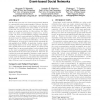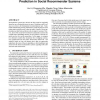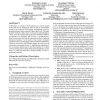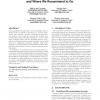65
Voted
RECSYS
2015
ACM
9 years 10 months ago
2015
ACM
Recommender systems research is by and large based on comparisons of recommendation algorithms’ predictive accuracies: the better the evaluation metrics (higher accuracy scores ...
75
Voted
RECSYS
2015
ACM
9 years 10 months ago
2015
ACM
The Web has grown into one of the most important channels to communicate social events nowadays. However, the sheer volume of events available in event-based social networks (EBSN...
RECSYS
2015
ACM
9 years 10 months ago
2015
ACM
Recommender systems have become de facto tools for suggesting items that are of potential interest to users. Predicting a user’s rating on an item is the fundamental recommendat...
70
Voted
RECSYS
2015
ACM
9 years 10 months ago
2015
ACM
Large scale virtual worlds such as massive multiplayer online games or 3D worlds gained tremendous popularity over the past few years. With the large and ever increasing amount of...
73
Voted
RECSYS
2015
ACM
9 years 10 months ago
2015
ACM
Laboratory studies are a common way of comparing recommendation approaches with respect to different quality dimensions that might be relevant for real users. One typical experim...
63
Voted
RECSYS
2015
ACM
9 years 10 months ago
2015
ACM
Social networks facilitate a variety of social, economic, and political interactions. Homophily and social influence suggest that preferences (e.g., over products, services, poli...
RECSYS
2015
ACM
9 years 10 months ago
2015
ACM
In this paper, we present work-in-progress of a recently started project that aims at studying the effect of time in recommender systems in the context of social tagging, consolid...
RECSYS
2015
ACM
9 years 10 months ago
2015
ACM
Recommendation systems have been successfully used to provide items of interest to the users (e.g., movies, music, books, news, images). However, traditional recommendation system...






